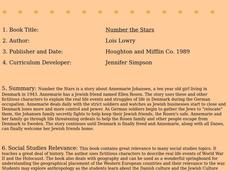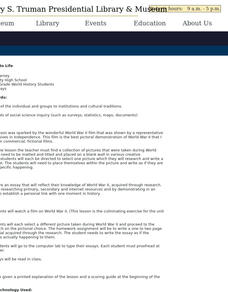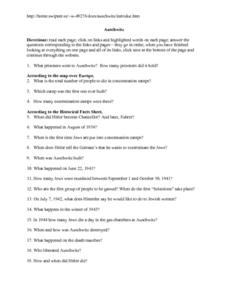Curated OER
The July Crisis: Can You Stop the Great War?
Learners role-play as diplomats from countries involved in World War I who have received telegrams stating they must prepare presentations on their country's position about the war. They have 45 minutes to reach a peace accord, or they...
Curated OER
Map Skills
Students construct a road map using map pieces precut by the teacher. They apply geometric terms such as rotation and turns. Students apply the use of ordinal directions. They apply a variety of map keys.
Curated OER
Basics of the Korean War
Students research the key players and major events of the Korean War. Students assigned in groups, research a country involved in the Korean War. Groups then bring their information to the whole groups to explain their country's...
PBS
An Attack on Syria- What Would You Do?
Has United States military intervention in the conflicts of other countries always been warranted? After reviewing a brief background on contemporary US conflicts and reading articles describing the civil war in Syria, your learners...
Curated OER
Never To Forget
Tenth graders discuss the events leading up to antisemitic behavior in Europe during World War II. Through various activities, 10th graders acquaint themselves with the political ideology of Nazism and assess responsibility for the...
Curated OER
NATO Geography & Language
The class receives background information on NATO, an atlas, and a blank world map. They color the original 1949 countries in red, the 1952 additions in green, and the 1990 additions in blue. This exercise would be a good starting point...
Curated OER
Holocaust Pictures Exhibition
Students write reactions to selected pictures of the Holocaust. They view selected online pictures about the Holocaust and write their reactions. They use their knowledge about the Holocaust to write reactions to pictures about this period.
Curated OER
Number the Stars
Students read Number the Stars. In this social studies lesson, students read the story and use a map of western Europe and identify the countries involved in the war. Students locate the cities of Denmark that are discussed in the story.
Curated OER
America's Wars
Pupils classify information regarding American involvement in wars. In this classification lesson, students examine the causes of the war in which the United States has been involved, and classify them as mainly political, social,...
Curated OER
American Civil War
Eighth graders read a collection of stories about the Civil War. Based upon their readings, they perform various activities to reinforce facts about the Civil War. Students create time lines, maps and reports about the war. They...
Curated OER
Korean War
Students identify and interpret general information about the Korean War, including important dates, terms, events, and participants. They also identify what the Cairo Declaration was and what military forces, political forces, and...
Scholastic
Drones Take Off
Ever wonder what drones are doing high above us in the sky? This article gives your class an insight to what those robots in the sky are doing. After reading an article on drone technology, pupils are prompted to respond to a variety of...
Annenberg Foundation
Teaching Geography: Workshop 4—North Africa/Southwest Asia
Can Jerusalem be equitably organized? Can Israel and Palestine be successfully partitioned? Part one of a two-part workshop looks at the geo-political history of Jerusalem while Part two investigates Egypt's dependence of the Nile River...
Curated OER
Locating The Cold War
Students identify major players in the Cold War and place them on a world map. They identify the two superpowers location on the map as well as their allies. Students analyze how the world divided itself.
Curated OER
Selling Warfare - Propaganda Posters
Students examine the use and purpose of propaganda posters during World War I. They work in groups to create a propaganda poster supporting a nation's war effort.
Curated OER
The End of United States' Occupation of Japan
Ninth graders examine and discuss reasons for end of U.S. occupation of Japan in 1952, locate surrounding Asian countries on map, explore changes to Japan after World War II, and discuss how changes in Japan impacted other countries.
Curated OER
Legends Coming to Life
Students prepare an essay that reflect their knowledge of World War II, acquired through research.
Society for Science & the Public
Easter Islanders Made Tools, Not War
When studying artifacts, especially tools, how do archaeologists determine what the devices were used for? In what ways might researchers' previous experiences influence their perception of an artifact? An article about researchers'...
Global Oneness Project
Architectural Wonders
Angkor Wat, a UNESCO World Heritage Site located in Cambodia, is the focus of a lesson that asks class members to consider factors that could result in the destruction of these archeological treasures. Pupils listen to a lecture on the...
Curated OER
Remember the Bridge: Poems of a People
Fifth graders explore poems of African Americans. They research a famous African American, write a report, create a timeline of events in African American history, create a map of the New World, and research Molly Walsh. After...
Curated OER
History-Causes of WW I
Seventh graders participate in a class discussion about what caused World War II. Working in groups, they identify the reasons they believe were most important in starting the war and present their reason in the form of a PowerPoint,...
Curated OER
Auschwitz
In the Auschwitz worksheet, students respond to 36 short answer questions as they visit and research websites pertaining to the infamous concentration camp of World War II.
Curated OER
Map Lesson Plan
Fourth graders locate and label major sites related to the Revolutionary War in the Hudson River Valley. They examine topographical features of each site and list a few of these features and list two advantages of each military site.
Curated OER
Speaking Out Against War
Students research on the Web and in other venues to track the Iraq war protests high school students have joined or even led. Students interview students in your community who have joined protests or expressed their views in other ways...

























